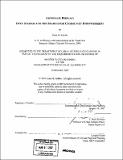Artists on display : open studios and the search for community empowerment
Author(s)
Peditto, Gena M
DownloadFull printable version (5.001Mb)
Other Contributors
Massachusetts Institute of Technology. Dept. of Urban Studies and Planning.
Advisor
J. Mark Schuster.
Terms of use
Metadata
Show full item recordAbstract
The much publicized and mythologized transformation of cities such as Barcelona and urban neighborhoods like SoHo in New York City, have led to broader ideas about the "Creative City," the "Creative Economy," and the "Creative Class." In an attempt to reap the promised riches of wealth, job creation, and prestige, some cities have developed strategies to promote their "livable" neighborhoods and attract "creative" workers and cultural tourism, but these ideas support a specific conception of what art and creativity is and what the role of artists should be in revitalization. The overall message that is conveyed is that consumption-oriented arts and entertainment ventures are more highly valued than noncommercial arts incubators and venues. Much like an ecological system, the success of commercial arts ventures is dependent on the success of the noncommercial arts venues. By focusing solely on commercial exchange, a city may fail to sustain all the parts necessary for a healthy arts community. Likewise, the arts community's embrace of commercial opportunities, in combination with the lack of a unified voice that calls for nurturing the arts community's unique and rich diversity, sends a signal back to the city that the disruption of their "arts ecology" is acceptable. venues, nurture creativity and innovative ideas, and promote diverse conceptions of art? (cont.) This thesis investigates a portion of that ecology: Open Studio events. It considers nine neighborhood-wide Open Studio events in Boston, Massachusetts, from the perspectives of the organizers (the neighborhoods and the city) and the participants (individual artists), and asks why these events are being created. What purpose do they serve? Beginning with a review of the larger trends that influence Boston's arts communities and its Open Studios, it traces the evolution of underlying motivations in organizing Open Studios - from politics to artist community building to neighborhood economic development and revitalization. It then analyzes the participating artists' complex range of motivations, going well beyond the casual assumption that artists participate to sell their work. This analysis leads to the conclusion that the nature of Open Studios has shifted away from its focus on art and artists. This shift can be nicely explained with Pierre Bourdieu's "Forms of Capital" theory. Born out of a criticism of classical economics, this theory explains the structure and function of society through the relationships between economic, social, and cultural capitals. (cont.) Finally, the question of what to do with Open Studios is raised. Should they be repositioned away from their current commercial form? Or should Open Studios remain unchanged, thereby requiring the city, developers, and arts community to reconsider how they value noncommercial venues, nurture creativity and innovative ideas, and promote diverse conceptions of art?
Description
Thesis (M.C.P.)--Massachusetts Institute of Technology, Dept. of Urban Studies and Planning, 2007. Includes bibliographical references (p. 93-95).
Date issued
2007Department
Massachusetts Institute of Technology. Department of Urban Studies and PlanningPublisher
Massachusetts Institute of Technology
Keywords
Urban Studies and Planning.